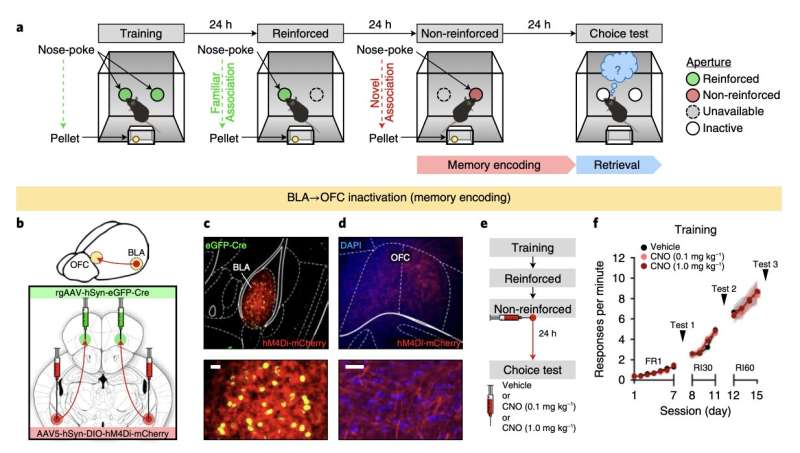October 5, 2022 feature
Study identifies a neural network supporting flexible learning and memory

People often need to adapt to unexpected and sudden events, such as a road construction or a road accident while driving, a broken automatic payment or ATM machine, and changes in weather. To effectively deal with these events, they must possess what is known as behavioral flexibility, or the ability to deviate from routine and well-establish behavioral patterns.
To adapt their behavior based on unforeseen events, humans need to encode and retrieve reward-related memories and use them to inform their present or future choices. This process entails the integration of different cognitive abilities that are supported by different regions of the brain.
Past studies found that patients with different neuropsychiatric disorders and those suffering from an addiction tend to have a scarce behavioral flexibility. This often adversely affects their quality of living, as it makes dealing with the uncertainty of daily life particularly challenging.
Researchers at Emory University School of Medicine have recently carried out a study aimed at better understanding the neural underpinnings of behavioral flexibility. Their paper, published in Nature Neuroscience, identifies a specific network of brain regions that could coordinate flexible learning and memory in humans, which could be impaired in individuals with addictions or other neuropsychiatric disorders.
The researchers specifically looked at the orbitofrontal cortex (OFC), a brain region known to decode and represent some sensory reward-based stimuli. The OFC is also believed to be involved in learning that occurs over time, after humans or animals are consistently rewarded or punished for specific behaviors.
"The OFC supports outcome-guided behaviors," Dan C. Li and his colleagues wrote in their paper. "However, the coordinated neural circuitry and cellular mechanisms by which OFC connections sustain flexible learning and memory remain elusive. We demonstrate in mice that basolateral amygdala (BLA)→OFC projections bidirectionally control memory formation when familiar behaviors are unexpectedly not rewarded, whereas OFC→dorsomedial striatum (DMS) projections facilitate memory retrieval."
To identify OFC circuits that mediate the learning and memory processes involved in behavioral flexibility, Li and his colleagues carried out a series of experiments on mice. Specifically, they assessed the ability of mice to adapt their behavior when they unexpectedly did not receive a reward for actions that had previously been rewarded.
The researchers observed the behavior of the mice throughout their experiment and collected measurements that allowed them to determine which brain networks underpinned the mice's behaviors. Their results shed new light on a brain network that could be involved in behavioral flexibility, which includes three areas of the brain, namely the basolateral amygdala (BLA), the OFC, and the dorsomedial striatum (DMS).
"OFC neuronal ensembles store a memory trace for newly learned information, which appears to be facilitated by circuit-specific dendritic spine plasticity and neurotrophin signaling within defined BLA–OFC–DMS connections and obstructed by cocaine," Li and his colleagues wrote in their paper. "Thus, we describe the directional transmission of information within an integrated amygdalo-fronto-striatal circuit across time, whereby novel memories are encoded by BLA→OFC inputs, represented within OFC ensembles and retrieved via OFC→DMS outputs during future choice."
The recent work by this team of researchers offers some new insight about how behavioral flexibility is enabled by the mammalian brain. More specifically, the researchers showed that the learning and memory processes underpinning flexible behavioral adaptation could be the result of specific interactions between the BLA, OFC, and DMS.
These findings could soon pave the way for additional studies aimed at further investigating this newly delineated brain network and how it may promote flexible learning and memory retrieval. In the future, this could potentially help to devise new treatment strategies that might help to increase the behavioral flexibility of people with addictions, anxiety, and other debilitating neuropsychiatric conditions.
More information: Dan C. Li et al, A molecularly integrated amygdalo-fronto-striatal network coordinates flexible learning and memory, Nature Neuroscience (2022). DOI: 10.1038/s41593-022-01148-9
© 2022 Science X Network





















